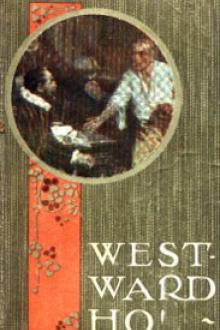Westward Ho! Or, The Voyages and Adventures of Sir Amyas Leigh, Knight, of Burrough, in the County of Devon, in the Reign of Her Most Glorious Majesty Queen Elizabeth by - (acx book reading .TXT) 📖

- Author: -
Book online «Westward Ho! Or, The Voyages and Adventures of Sir Amyas Leigh, Knight, of Burrough, in the County of Devon, in the Reign of Her Most Glorious Majesty Queen Elizabeth by - (acx book reading .TXT) 📖». Author -
“Plague on you, hold your tongue. Has he any right to look at me as he does, whenever I pass him?”
“That depends on how he looks; a cat may look at a king, provided she don't take him for a mouse.”
“Oh, I know how he looks, and what he means too, and he shall stop, or I will stop him. And the other day, when I spoke of Rose Salterne”—“Ah!” groaned Frank, “Ate's apple again!”—“(never mind what I said) he burst out laughing in my face; and is not that a fair quarrel? And what is more, I know that he wrote a sonnet, and sent it to her to Stow by a market woman. What right has he to write sonnets when I can't? It's not fair play, Mr. Frank, or I am a Jew, and a Spaniard, and a Papist; it's not!” And Will smote the table till the plates danced again.
“My dear knight of the burning pestle, I have a plan, a device, a disentanglement, according to most approved rules of chivalry. Let us fix a day, and summon by tuck of drum all young gentlemen under the age of thirty, dwelling within fifteen miles of the habitation of that peerless Oriana.”
“And all 'prentice-boys too,” cried Amyas, out of the pasty.
“And all 'prentice-boys. The bold lads shall fight first, with good quarterstaves, in Bideford Market, till all heads are broken; and the head which is not broken, let the back belonging to it pay the penalty of the noble member's cowardice. After which grand tournament, to which that of Tottenham shall be but a flea-bite and a batrachomyomachy—”
“Confound you, and your long words, sir,” said poor Will, “I know you are flouting me.”
“Pazienza, Signor Cavaliere; that which is to come is no flouting, but bloody and warlike earnest. For afterwards all the young gentlemen shall adjourn into a convenient field, sand, or bog—which last will be better, as no man will be able to run away, if he be up to his knees in soft peat: and there stripping to our shirts, with rapiers of equal length and keenest temper, each shall slay his man, catch who catch can, and the conquerors fight again, like a most valiant main of gamecocks as we are, till all be dead, and out of their woes; after which the survivor, bewailing before heaven and earth the cruelty of our Fair Oriana, and the slaughter which her basiliscine eyes have caused, shall fall gracefully upon his sword, and so end the woes of this our lovelorn generation. Placetne Domini? as they used to ask in the Senate at Oxford.”
“Really,” said Cary, “this is too bad.”
“So is, pardon me, your fighting Mr. Coffin with anything longer than a bodkin.”
“Bodkins are too short for such fierce Bobadils,” said Amyas; “they would close in so near, that we should have them falling to fisticuffs after the first bout.”
“Then let them fight with squirts across the market-place; for by heaven and the queen's laws, they shall fight with nothing else.”
“My dear Mr. Cary,” went on Frank, suddenly changing his bantering tone to one of the most winning sweetness, “do not fancy that I cannot feel for you, or that I, as well as you, have not known the stings of love and the bitterer stings of jealousy. But oh, Mr. Cary, does it not seem to you an awful thing to waste selfishly upon your own quarrel that divine wrath which, as Plato says, is the very root of all virtues, and which has been given you, like all else which you have, that you may spend it in the service of her whom all bad souls fear, and all virtuous souls adore,—our peerless queen? Who dares, while she rules England, call his sword or his courage his own, or any one's but hers? Are there no Spaniards to conquer, no wild Irish to deliver from their oppressors, that two gentlemen of Devon can find no better place to flesh their blades than in each other's valiant and honorable hearts?”
“By heaven!” cried Amyas, “Frank speaks like a book; and for me, I do think that Christian gentlemen may leave love quarrels to bulls and rams.”
“And that the heir of Clovelly,” said Frank, smiling, “may find more noble examples to copy than the stags in his own deer-park.”
“Well,” said Will, penitently, “you are a great scholar, Mr. Frank, and you speak like one; but gentlemen must fight sometimes, or where would be their honor?”
“I speak,” said Frank, a little proudly, “not merely as a scholar, but as a gentleman, and one who has fought ere now, and to whom it has happened, Mr. Cary, to kill his man (on whose soul may God have mercy); but it is my pride to remember that I have never yet fought in my own quarrel, and my trust in God that I never shall. For as there is nothing more noble and blessed than to fight in behalf of those whom we love, so to fight in our own private behalf is a thing not to be allowed to a Christian man, unless refusal imports utter loss of life or honor; and even then, it may be (though I would not lay a burden on any man's conscience), it is better not to resist evil, but to overcome it with good.”
“And I can tell you, Will,” said Amyas, “I am not troubled with fear of ghosts; but when I cut off the Frenchman's head, I said to myself, 'If that braggart had been slandering me instead of her gracious majesty, I should expect to see that head lying on my pillow every time I went to bed at night.'”
“God forbid!” said Will, with a shudder. “But what shall I do? for to the market tomorrow I will go, if it were choke-full of Coffins, and a ghost in each coffin of the lot.”
“Leave the matter to me,” said Amyas. “I have my device, as well as scholar Frank here; and if there be, as I suppose there must be, a quarrel in the market to-morrow, see if I do not—”
“Well, you are two good fellows,” said Will. “Let us have another tankard in.”
“And drink the health of Mr. Coffin, and all gallant lads of the North,” said Frank; “and now to my business. I have to take this runaway youth here home to his mother; and if he will not go quietly, I have orders to carry him across my saddle.”
“I hope your nag has a strong back, then,” said Amyas; “but I must go on and see Sir Richard, Frank. It is all very well to jest as we have been doing, but my mind is made up.”
“Stop,” said Cary. “You must stay here tonight; first, for good fellowship's sake; and next, because I want the advice of our Phoenix here, our oracle, our paragon. There, Mr. Frank, can you construe that for me? Speak low, though, gentlemen both; there comes my father; you had better give me the letter again. Well, father, whence this morning?”
“Eh, company here? Young men, you are always welcome, and such as you. Would there were more of your sort in these dirty times! How is your good mother, Frank, eh? Where have I been, Will? Round the house-farm, to look at the
 Have you ever thought about what fiction is? Probably, such a question may seem surprising: and so everything is clear. Every person throughout his life has to repeatedly create the works he needs for specific purposes - statements, autobiographies, dictations - using not gypsum or clay, not musical notes, not paints, but just a word. At the same time, almost every person will be very surprised if he is told that he thereby created a work of fiction, which is very different from visual art, music and sculpture making. However, everyone understands that a student's essay or dictation is fundamentally different from novels, short stories, news that are created by professional writers. In the works of professionals there is the most important difference - excogitation. But, oddly enough, in a school literature course, you don’t realize the full power of fiction. So using our website in your free time discover fiction for yourself.
Have you ever thought about what fiction is? Probably, such a question may seem surprising: and so everything is clear. Every person throughout his life has to repeatedly create the works he needs for specific purposes - statements, autobiographies, dictations - using not gypsum or clay, not musical notes, not paints, but just a word. At the same time, almost every person will be very surprised if he is told that he thereby created a work of fiction, which is very different from visual art, music and sculpture making. However, everyone understands that a student's essay or dictation is fundamentally different from novels, short stories, news that are created by professional writers. In the works of professionals there is the most important difference - excogitation. But, oddly enough, in a school literature course, you don’t realize the full power of fiction. So using our website in your free time discover fiction for yourself. 




Comments (0)